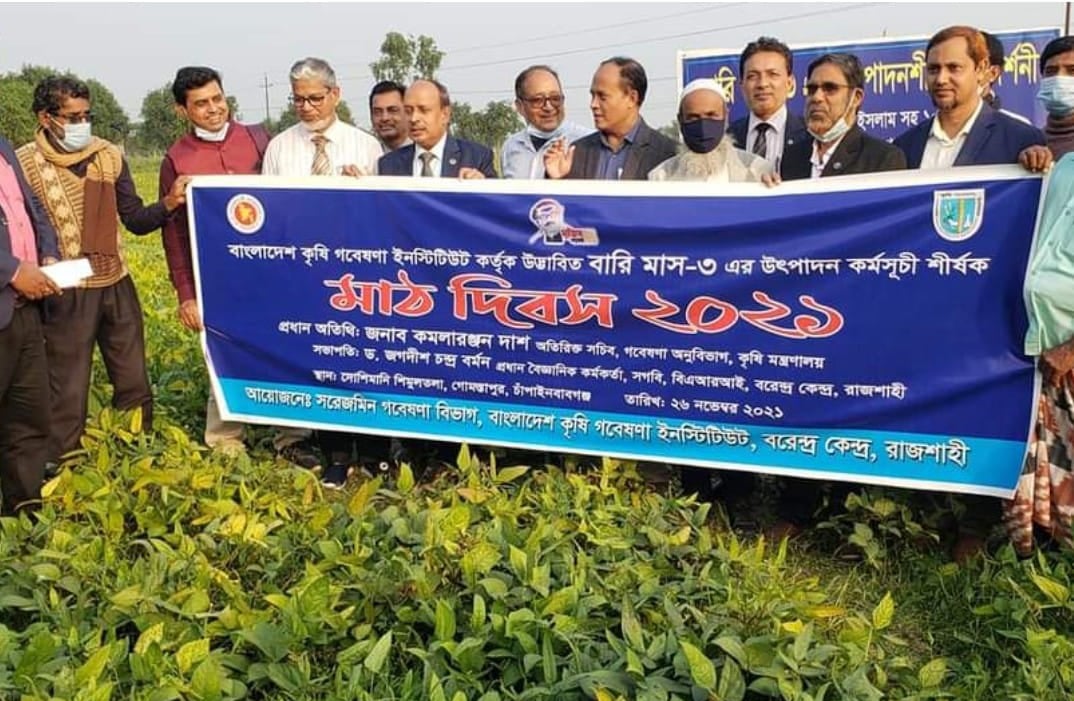
RAJSHAHI, Nov 27, 2021 (BSS) - Agricultural scientists and researchers have
urged the farmers to cultivate the newly innovated maskalai (black gram)
variety as it is high yielding and tolerant to the adverse impact of climate
change.
There is bright prospect of expanding the variety in the region, including
its vast char (river bed) lands, and the farmers are the vital force of
materializing the prospects, they said.
The experts came up with the observation while addressing a farmers' field
day titled "Production Programme of BARI MASH-3 released by Bangladesh
Agriculture Research Institute (BARI)" on Friday afternoon.
The On Farm Research Division (OFRD) of BARI organized the programme in
Doshimani Shimultala area under Gomostapur Upazila in Chapainawabganj
district aimed at popularizing the variety among the grassroots farmers.
Additional Secretary to the Ministry of Agriculture Kamalaranjan Das
addressed the meeting as the chief guest.
Director of Pulse Research Centre Dr Mohiuddin spoke as the special guest
with OFRD, Barind Centre Principal Scientific Officer Dr Jagadish Chandra
Barman in the chair.
Chief Scientific Officer of Regional Horticulture Research Station Dr
Mukhlesur Rahman, Principal Scientific Officer of Fruit Research Station Dr
Alim Uddin and OFRD Senior Scientific Officer Dr Shakhawat Hossain also
spoke.
Farmers apprised the experts that they have become happy after cultivating
the variety on the fallow lands in vast char areas during the last couple of
years.
Acreage of the variety is gradually increasing as per acre yield is more
than the existing indigenous varieties.
Huge char lands of the Padma and Mohananda rivers which remained fallow
after monsoon for a long time are being brought under the mass-kalai farming.
The farmers viewed that they earlier used to cultivate indigenous mash-
kalai varieties in a scattered way and many of the lands would remain fallow.
Apart from this, yield of those was very poor, hardly one to one and a
half mounds per bigha. After getting seeds from OFRD and according to its
guidelines, they have been cultivating the new variety since last year.
The farmers are very much interested in boosting its farming in the years
to come as the variety's yield is more than four to five mounds per bigha.
There is no additional cost for mash-kalai production except for only one
or two plowings. Cost of one bigha of farming is around Taka 750 whereas its
outcome can fetch Taka 7,000 to 8000.
In his remarks, Kamalaranjan Das said huge land of the char area remained
fallow after receding flood water every year.
So, there is an enormous scope of elevating the socio-economic condition
of the local community through the best uses of the fallow lands if those
were brought under farming of the variety.
He referred to various salient features of the cash crops. He said: "No
additional cost for fertilizer, pesticide and irrigation is needed to
cultivate this short-term cash crop".
Terming it as eco-friendly, he said the farming is most effective for
boosting soil fertility. Requisite seeds should be distributed among farmers.
Kamalaranjan said the Rajshahi and Chapainawabganj districts along with
their vast char areas are very much popular for mass-kalai farming and its
production.